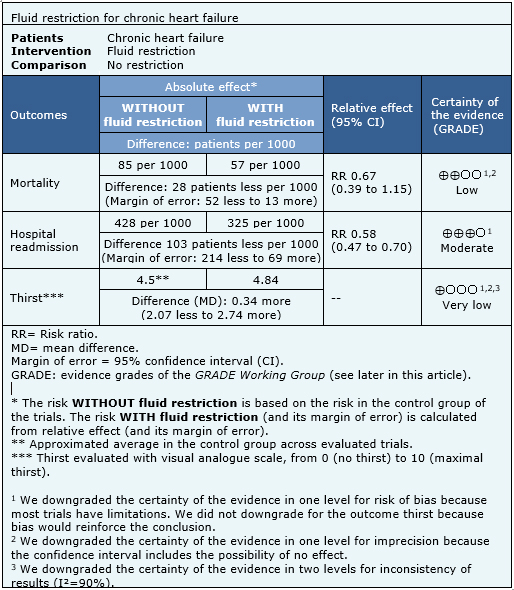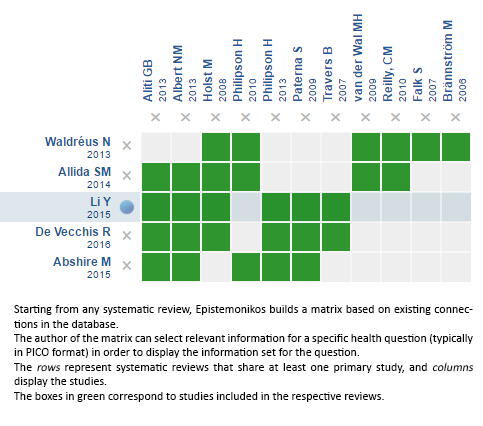Epistemonikos summaries
← vista completaPublished on January 9, 2017 | http://doi.org/10.5867/medwave.2017.6817
Is fluid restriction needed in heart failure?
¿Es necesario restringir el volumen en la insuficiencia cardíaca crónica?
Abstract
Fluid restriction is usually recommended in chronic heart failure. However, the evidence base to support this is not that clear. Searching in Epistemonikos database, which is maintained by screening multiple databases, we identified five systematic reviews evaluating 11 studies addressing the question of this article, including seven randomized trials. We extracted data, combined the evidence using meta-analysis and generated a summary of findings table following the GRADE approach. We concluded fluid restriction probably decreases hospital readmission in chronic heart failure and might decrease mortality, but the certainty of the evidence for the latter is low.
Problem
Chronic heart failure is a morbidity that impairs quality of life, requires frequent hospitalization and increases mortality. Many symptoms of heart failure are a consequence of sodium and fluid overload, so it is usually recommended to restrict fluid intake as a way to compensate volume overload. However, this measure might also have negative consequences, such as thirst, orthostatic hypotension and renal failure. It is not clear whether this recommendation is supported by scientific evidence.
Methods
We used Epistemonikos database, which is maintained by screening multiple databases, to identify systematic reviews and their included primary studies. With this information, we generated a structured summary using a pre-established format, which includes key messages, a summary of the body of evidence (presented as an evidence matrix in Epistemonikos), meta-analysis of the total of studies, a summary of findings table following the GRADE approach and a table of other considerations for decision-making.
|
Key messages
|
About the body of evidence for this question
|
What is the evidence. |
We found five systematic reviews [1],[2],[3],[4],[5] including 11 primary studies relevant to the question of this article, reported in 12 references [6],[7],[8],[9],[10],[11],[12],[13],[14],[15], [16],[17], among them seven randomized trials reported in eight references [6],[7],[8],[9],[10],[11],[12],[13]. Two trials evaluated patients with acute heart failure, so they were not considered relevant to the question addressed in this summary [8],[10].This table and the summary in general are based on the five randomized trials evaluating patients with chronic heart failure [6],[7],[9],[11],[12]. |
|
What types of patients were included |
Four trials evaluated patients with compensated heart failure [6],[7],[9],[12] and one included decompensated patients [11]. |
|
What types of interventions were included |
In two trials, fluid restriction was 1 litre per day [9],[11] and in three was 1.5 litres per day [6],[7],[12]. |
|
What types of outcomes |
The different reviews grouped outcomes as follows:
|
Summary of findings
The information on the effects of fluid restriction for chronic heart failure is based on four randomized trials including 678 participants, because one trial did not report any outcome of interest, or did not present it in a way it could be incorporated in a meta-analysis [12]. Four trials reported the outcomes mortality and hospital readmission [6],[7],[9],[11] and three reported thirst [6],[7],[9].
The summary of findings is the following:
- Fluid restriction might decrease mortality in chronic heart failure, but the certainty of the evidence is low.
- Fluid restriction probably decreases hospital readmission in chronic heart failure. The certainty of the evidence is moderate.
- It is not clear whether fluid restriction increases thirst because the certainty of the evidence is very low.


Other considerations for decision-making
|
To whom this evidence does and does not apply |
|
| About the outcomes included in this summary |
|
| Balance between benefits and risks, and certainty of the evidence |
|
| What would patients and their doctors think about this intervention |
|
| Resource considerations |
|
|
Differences between this summary and other sources |
|
| Could this evidence change in the future? |
How we conducted this summary
Using automated and collaborative means, we compiled all the relevant evidence for the question of interest and we present it as a matrix of evidence.

Follow the link to access the interactive version: Fluid restriction for chronic heart failure
Notes
The upper portion of the matrix of evidence will display a warning of “new evidence” if new systematic reviews are published after the publication of this summary. Even though the project considers the periodical update of these summaries, users are invited to comment in Medwave or to contact the authors through email if they find new evidence and the summary should be updated earlier. After creating an account in Epistemonikos, users will be able to save the matrixes and to receive automated notifications any time new evidence potentially relevant for the question appears.
The details about the methods used to produce these summaries are described here http://dx.doi.org/10.5867/medwave.2014.06.5997.
Epistemonikos foundation is a non-for-profit organization aiming to bring information closer to health decision-makers with technology. Its main development is Epistemonikos database (www.epistemonikos.org).
These summaries follow a rigorous process of internal peer review.
Conflicts of interest
The authors do not have relevant interests to declare.

